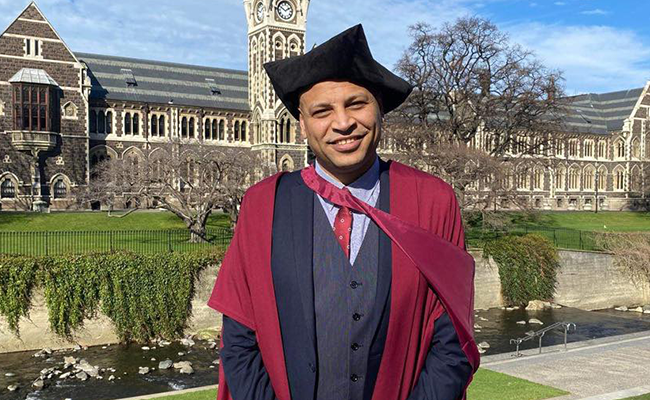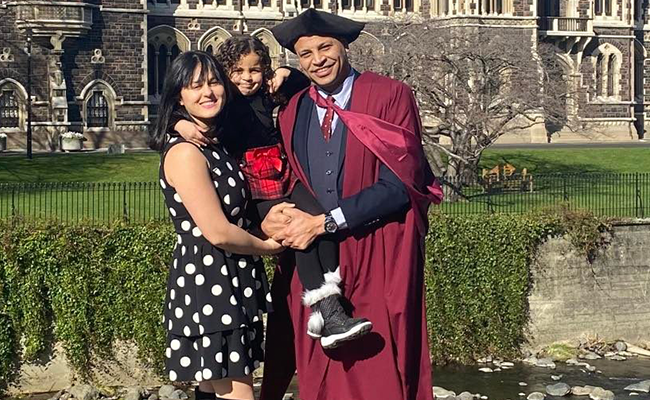
Dr Sherif Ammar graduated with his PhD in Public Health in August.
Conducting surveillance on mosquitoes has been all part of the journey for PhD graduate Dr Sherif Ammar, who completed his PhD in Public Health at the University of Otago in Wellington and graduated in August.
Dr Ammar is a medical entomologist who specialises in mosquito-borne diseases. He completed his MSc at Ain-Shams University in his native Egypt in 2012.
When he moved to New Zealand in 2017, it was the culmination of a long-standing ambition, he explains.
“A 15-year-old dream came true, not only when my PhD proposal was accepted by the University, but also when I won a three-year doctorate scholarship.”
Dr Ammar's PhD investigated the risk of local transmission of mosquito-borne diseases such as dengue, Zika, chikungunya and Ross River virus in New Zealand, an increasing risk as the climate warms. His results provide a basis to develop a national early warning system to prevent a potential national biosecurity breach and subsequent transmission of mosquito-borne disease in New Zealand.
He has published five scientific papers in prestigious international journals about his findings, and was awarded the University of Otago, Wellington Brett Delahunt PhD Research Prize for social sciences/public health in 2021. His PhD was supervised by Professors Simon Hales and Michael Baker and Dr Mary McIntyre.
Dr Ammar now works as an epidemiologist at ESR (the Institute of Environmental Science and Research), where he is responsible for producing epidemiological reports on arboviruses and mosquito-borne diseases for the Ministry of Health and the World Health Organization (WHO).
There have been plenty of challenges to overcome through his five-year PhD journey, not least that Dr Ammar and his five-month pregnant wife Emna Ben Hassine knew no one when they came to New Zealand.
“When my wife and I arrived, we were complete strangers,” he says. “At our daughter Layla's first birthday party, more than 40 friends of different nationalities and beliefs attended. This was one of the biggest achievements of my PhD journey.”
Dr Ammar was highly commended for academic excellence in the 2019 Wellington International Student Excellence Awards, which acknowledge students for their work in community engagement, leadership, academic and creative pursuits.
The award in part recognised the role Dr Ammar played as a commentator on the Christchurch mosque attacks in March 2019.

Dr Ammar with his wife Emna Ben Hassine and daughter Layla.
“After the unfortunate events of Christchurch, as an Egyptian social media influencer living in New Zealand, I was honoured to be the voice of truth to Middle Eastern television stations and social networks, clarifying that New Zealand is a country of tolerance, and that what happened does not represent Kiwis.”
An active human rights campaigner, with about 250,000 followers on Facebook, Dr Ammar's posts about the Christchurch terror attacks were shared more than 10,000 times.
It was his support for people's rights to freedom of religious belief which cut short his career as a medical entomologist in one of the Gulf countries and indirectly led to his move to New Zealand.
“My championing of human rights was placing me in opposition to local religious beliefs and it became clear that I needed to leave.”
It was then that he returned to his long-held dream of doing a PhD abroad.
“One year later, after shuttling between Egypt and my wife Emna's home in Tunisia, we were moving to a country on the other side of the world.”
Dr Ammar says he has been grateful for the support he has received from the Head of the Department of Public Health, Professor Louise Signal, during his time at Otago.
“On my birthday, she showed up unexpectedly at my house, with her opera-singing husband Peter Dykes, who sang Happy Birthday for me.”
He is also grateful for the support he and Emna have had from Senior Research Fellow Dr Julie Bennett, and her family, who have become very good friends.
This year, Dr Ammar was named 'the African success story of the year' and asked to speak at the Africa Day celebrations held at Parliament. At the event, he thanked those who had supported him through his PhD, saying they had given him superpowers, enabling him to achieve all he had.
“Sometimes it is not about the journey, or the destination, but about the people we meet along the way.”
- Kōrero by Cheryl Norrie, Communications Adviser, Wellington
